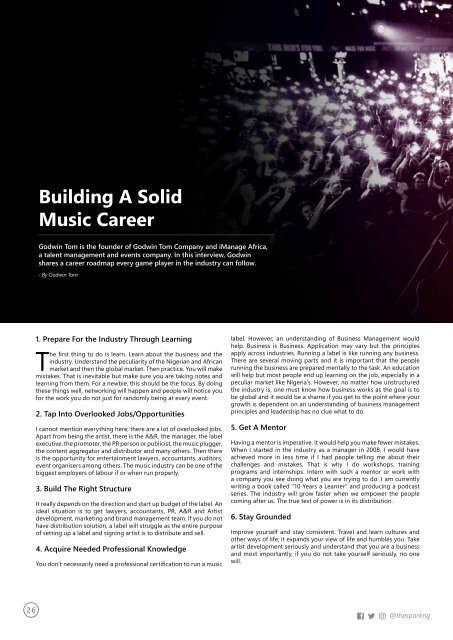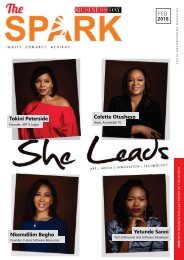April 2018
You also want an ePaper? Increase the reach of your titles
YUMPU automatically turns print PDFs into web optimized ePapers that Google loves.
The Spark | Ignite/Connect/Achieve www.thesparkng.com www.thesparkng.com The Spark | Ignite/Connect/Achieve<br />
Building A Solid<br />
Music Career<br />
Godwin Tom is the founder of Godwin Tom Company and iManage Africa,<br />
a talent management and events company. In this interview, Godwin<br />
shares a career roadmap every game player in the industry can follow.<br />
- By Godwin Tom<br />
“<br />
When I started in the industry as a<br />
manager in 2008, I would have<br />
achieved more in less time if I<br />
had people telling me about their<br />
challenges and mistakes.<br />
“<br />
1. Prepare For the Industry Through Learning<br />
The first thing to do is learn. Learn about the business and the<br />
industry. Understand the peculiarity of the Nigerian and African<br />
market and then the global market. Then practice. You will make<br />
mistakes. That is inevitable but make sure you are taking notes and<br />
learning from them. For a newbie, this should be the focus. By doing<br />
these things well, networking will happen and people will notice you<br />
for the work you do not just for randomly being at every event.<br />
2. Tap Into Overlooked Jobs/Opportunities<br />
I cannot mention everything here; there are a lot of overlooked jobs.<br />
Apart from being the artist, there is the A&R, the manager, the label<br />
executive, the promoter, the PR person or publicist, the music plugger,<br />
the content aggregator and distributor and many others. Then there<br />
is the opportunity for entertainment lawyers, accountants, auditors,<br />
event organisers among others. The music industry can be one of the<br />
biggest employers of labour if or when run properly.<br />
3. Build The Right Structure<br />
It really depends on the direction and start up budget of the label. An<br />
ideal situation is to get lawyers, accountants, PR, A&R and Artist<br />
development, marketing and brand management team. If you do not<br />
have distribution solution, a label will struggle as the entire purpose<br />
of setting up a label and signing artist is to distribute and sell.<br />
4. Acquire Needed Professional Knowledge<br />
You don’t necessarily need a professional certification to run a music<br />
label. However, an understanding of Business Management would<br />
help. Business is Business. Application may vary but the principles<br />
apply across industries. Running a label is like running any business.<br />
There are several moving parts and it is important that the people<br />
running the business are prepared mentally to the task. An education<br />
will help but most people end up learning on the job, especially in a<br />
peculiar market like Nigeria’s. However, no matter how unstructured<br />
the industry is, one must know how business works as the goal is to<br />
be global and it would be a shame if you get to the point where your<br />
growth is dependent on an understanding of business management<br />
principles and leadership has no clue what to do.<br />
5. Get A Mentor<br />
Having a mentor is imperative. It would help you make fewer mistakes.<br />
When I started in the industry as a manager in 2008, I would have<br />
achieved more in less time if I had people telling me about their<br />
challenges and mistakes. That is why I do workshops, training<br />
programs and internships. Intern with such a mentor or work with<br />
a company you see doing what you are trying to do. I am currently<br />
writing a book called “10 Years a Learner” and producing a podcast<br />
series. The industry will grow faster when we empower the people<br />
coming after us. The true test of power is in its distribution.<br />
6. Stay Grounded<br />
Improve yourself and stay consistent. Travel and learn cultures and<br />
other ways of life; it expands your view of life and humbles you. Take<br />
artist development seriously and understand that you are a business<br />
and most importantly, if you do not take yourself seriously, no one<br />
will.<br />
7. Let Your Audience Validate You<br />
There is no one way to do it. What is important is to understand<br />
where you are in the artiste life cycle. Validation is important. Just<br />
because you get feedback from family members and friends does<br />
not make you “a star with the next big hit”. Validation is when people<br />
you do not know confirm that you can sing. This happens when the<br />
artist takes time to perform at locations to develop him/her self.<br />
While labels can provide funding, most artistes forget it is a loan. The<br />
internet has provided all the tools to create and distribute content.<br />
So, if you do not find a label willing to take a gamble on you, take<br />
that gamble on yourself. Either way, it is in the artiste’s hands really.<br />
A fan base will help you make money. Do not put the cart in front of<br />
the horse. Build an audience and a following and you will have an<br />
audience to sell music to.<br />
8. Prepare For Challenges Ahead<br />
Like every start up business, there are the following stages; Start up,<br />
Struggle, Success and Growth. The excitement of starting something<br />
new is usually quickly destroyed by the reality of the cost of running<br />
a business with the bills, competition and change in policies that<br />
were not considered during the set up stage. You quickly learn that<br />
the audience is not as predictable and people do not really have a<br />
buying culture. The industry and lifestyle is expensive and because<br />
the market is very visual and bases most of its assumptions on<br />
perception, the artiste who does not show the lifestyle are seen as<br />
broke or lacking money.<br />
You will also learn that success can also drown you. The more<br />
successful you get, the harder it is to do things you sometimes enjoy<br />
doing like going to the movies, etc. While you can do it once in a<br />
while, it would have to be properly planned.<br />
Another issue is that there is too much dependence on show money<br />
because people are yet to understand the importance of publishing<br />
revenue among other things. There are broke producers in the<br />
country that do not realise that they have a lot of money scattered<br />
across the globe.<br />
You would also have to prove yourself so it is okay if people do not<br />
respond to you when you start. People only want to associate with<br />
success. Stay consistent and create good quality content.<br />
9. Tread Carefully with Family and Friends<br />
Family should support. However, unless a family member has the<br />
needed skills for the role the artiste wants them to do; it is advisable<br />
not to involve family in the business. While it is understandable that<br />
some artistes may not have help when they start, so a family member<br />
fills the void of a manager or PR consultant, it is important for the<br />
artist to be honest with self and identify when growth has occurred<br />
and when the family may not be able to operate in the scale that is<br />
now required. There are a few instances where family members have<br />
done great work, but I would advise that if family members working<br />
with the artistes do not deliver on KPIs, the talent or artiste should<br />
let them go and get professionals.<br />
26 27<br />
@thesparkng<br />
@thesparkng








